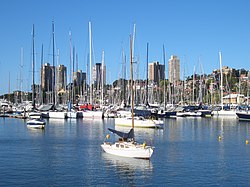Le Havre co-hosted the sailing events for both the 1900 and 1924 Summer Olympics held in Paris For the 1936 Summer Olympics in Berlin , one part of the Bay of Kiel hosted the sailing events. Thirty-six years later, another part of the Bay of Kiel hosted the Olympic sailing events though the Games were in Munich For the 2000 Summer Olympics in Sydney , the Olympic Sailing Shore Base in Rushcutters Bay hosted the sailing events For the Summer Olympics , there are 32 venues that have been or will be used for sailing . Most competitions took place for the early part of the Olympics at or near venues, but no specific yacht or sailing club was listed in the official Olympic report. In 1920 , the twelve-foot dinghy event set for Ostend was moved to the Netherlands at special request of the Belgian Olympic Committee . [ 1] The first specific yacht or sailing club to host the competitions took place in 1968 Summer Olympics in Mexico City though those competitions took place actually in Acapulco . [ 2] Eight years later in Montreal , the competitions took place on the Great Lakes in Kingston, Ontario , marking the first and only time the sailing competitions took place in freshwater . [ 3]
During the fifth race of the 1988 Summer Olympic sailing Finn event near Busan, Canada 's Lawrence Lemieux was in second place when he noticed Joseph Chan of Singapore in the water 25 yd (23 m) from his capsized boat. [ 4] Lemieux abandoned his position and rescued Chan and Chan's Singapore teammate. [ 4] [ 5] Even though Lemieux finished last in the race, the IOC gave him second place for the race as a result of Lemieux's heroic efforts. [ 6] [ 7] Lemieux would be awarded the IOC Pierre de Coubertin medal at the Finn medal awards ceremony by President Juan Antonio Samaranch . [ 5]
The 1992 Summer Olympic venue was noted for its numerous complaints from the sailors over the debris found at the Olympic Harbor. [ 8] Among the items found were dead rats and floating refrigerators. [ 8] It was so bad that Barcelona port authorities, under pressure from the International Yacht Racing Union (later International Sailing Federation , now World Sailing since 2015), assigned four garbage vessels to collect garbage daily. [ 8] In the men's windsurfer event, American Mike Gebhardt got a plastic bag caught on his boardsail in the last lap of the seventh race. [ 8] Six boardsailers passed Gebhardt before he could dislodge the plastic bag. [ 8] Gebhardt lost out a gold by 0.4 points over France 's Franck David . [ 8] [ 9]
Games Venue Other sports at venues for those games Capacity Ref. 1900 Paris Le Havre None Not listed. [ 10] Meulan-en-Yvelines None Not listed. [ 11] 1908 London Solent None Not listed. [ 12] Southampton Water Water motorsports Not listed. [ 13] 1912 Stockholm Nynäshamn None Not listed. [ 14] 1920 Antwerp Buiten Y (12 foot dinghy) None Not listed. [ 1] Ostend Polo Not listed. [ 15] [ 16] 1924 Paris Le Havre None 541 [ 17] Meulan-en-Yvelines None 389 [ 18] 1928 Amsterdam Buiten Y None 2,263 [ 19] Zuiderzee None 2,263 [ 19] 1932 Los Angeles Los Angeles Harbor None Not listed. [ 20] 1936 Berlin Kiel Bay None Not listed. [ 21] 1948 London Torbay None Not listed. [ 22] 1952 Helsinki Harmaja None Not listed. [ 23] Liuskasaari None 19,000 [ 23] 1956 Melbourne Port Phillip None Not listed [ 24] 1960 Rome Gulf of Naples None Not listed. [ 25] [ 26] 1964 Tokyo Enoshima None Not listed. [ 27] 1968 Mexico City Club de Yates de Acapulco None Not listed. [ 2] 1972 Munich Bay of Kiel None 4,000 on 14 steamers who wanted to watch the action. [ 28] 1976 Montreal Portsmouth Olympic Harbour None Not listed [ 3] 1980 Moscow Olympic Regatta in Tallinn None Not listed [ 29] 1984 Los Angeles Long Beach Shoreline Marina None Not listed. [ 30] 1988 Seoul Busan Yachting Center None 80 [ 31] 1992 Barcelona Olympic Harbour None Not listed. [ 32] 1996 Atlanta Wassaw Sound None 1,000 [ 33] [ 34] 2000 Sydney Rushcutters Bay None 10,000 [ 35] 2004 Athens Agios Kosmas Olympic Sailing Centre None 8,000 [ 36] 2008 Beijing Qingdao International Sailing Centre None A ticketed area was created for the first time in sailing on the breakwater of the marina. [ 37] 2012 London Weymouth and Portland National Sailing Academy None A ticketed spectator area was created away from the marina at Nothe Fort with a capacity of 5000 people. [ 38] 2016 Rio de Janeiro Marina da Glória None 10,000 [ 39] 2020 Tokyo Enoshima None 10,000 2024 Paris Old Port of Marseille None 5,000 2028 Los Angeles Belmont Veterans Memorial Pier None 6,000 2032 Brisbane Manly Boat Harbour None 10,000
This page is based on this
Wikipedia article Text is available under the
CC BY-SA 4.0 license; additional terms may apply.
Images, videos and audio are available under their respective licenses.




